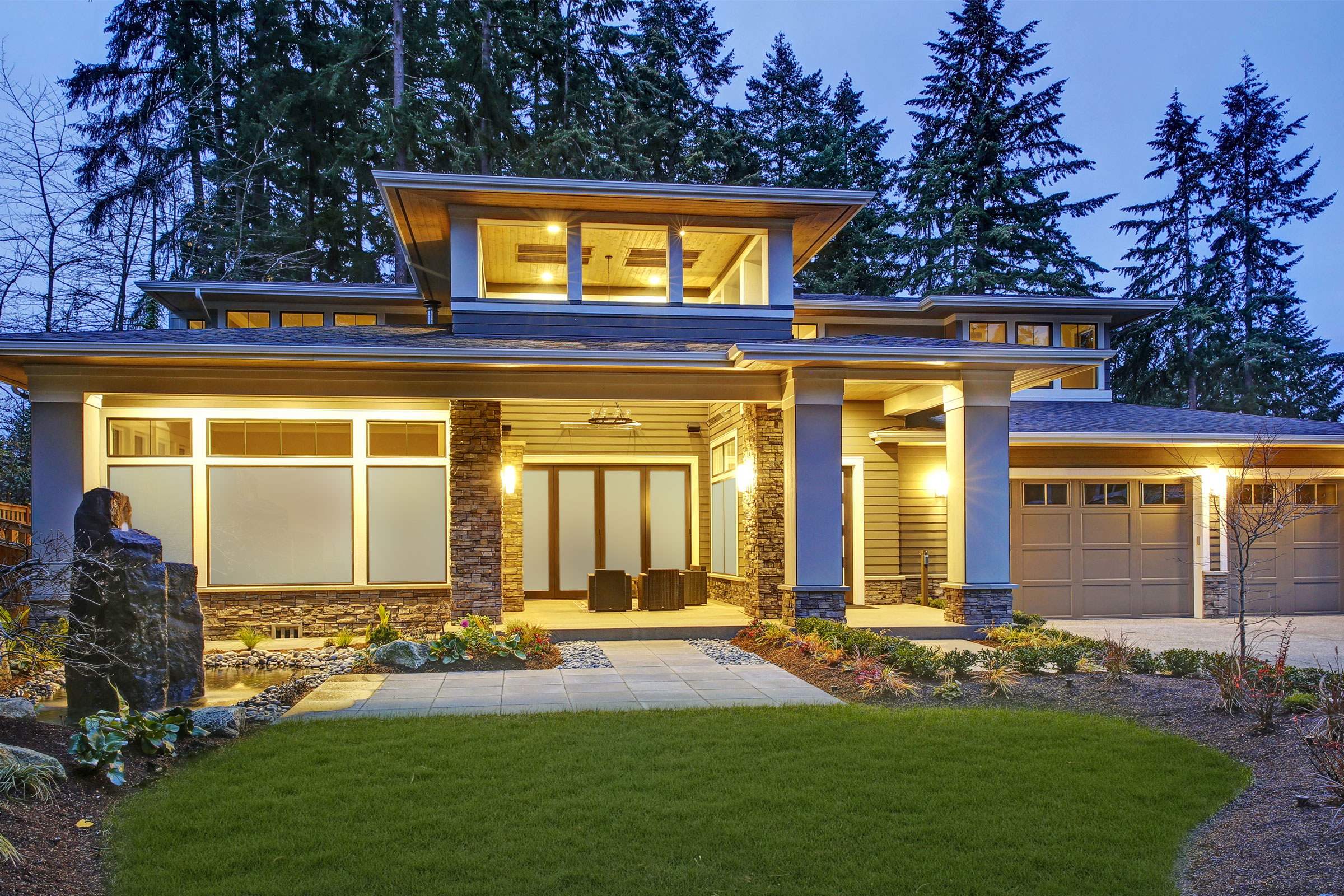Story at a glance:
- Residential privacy glass refers to windows and other glass elements designed to temporarily or continuously improve a property’s visual privacy.
- Common types of residential privacy glass include tinted, frosted, etched, rolled, patterned, mirrored, and electronically switchable glass.
- Cardinal Glass’ CLiC line of electronically switchable residential privacy glass uses revolutionary liquid crystal technology to achieve a high level of clarity while still offering unparalleled privacy.
In an age of surveillance and growing population densities, privacy has become something of a rarity, even within one’s own home.
And while there’s only so much that can be done to thwart technological breaches of privacy, there are still ways to keep your home safe from prying eyes and nosy neighbors—namely, residential privacy glass.
This article is an introductory guide to residential privacy glass and examines a few of the most common types currently available.
What is Residential Privacy Glass?
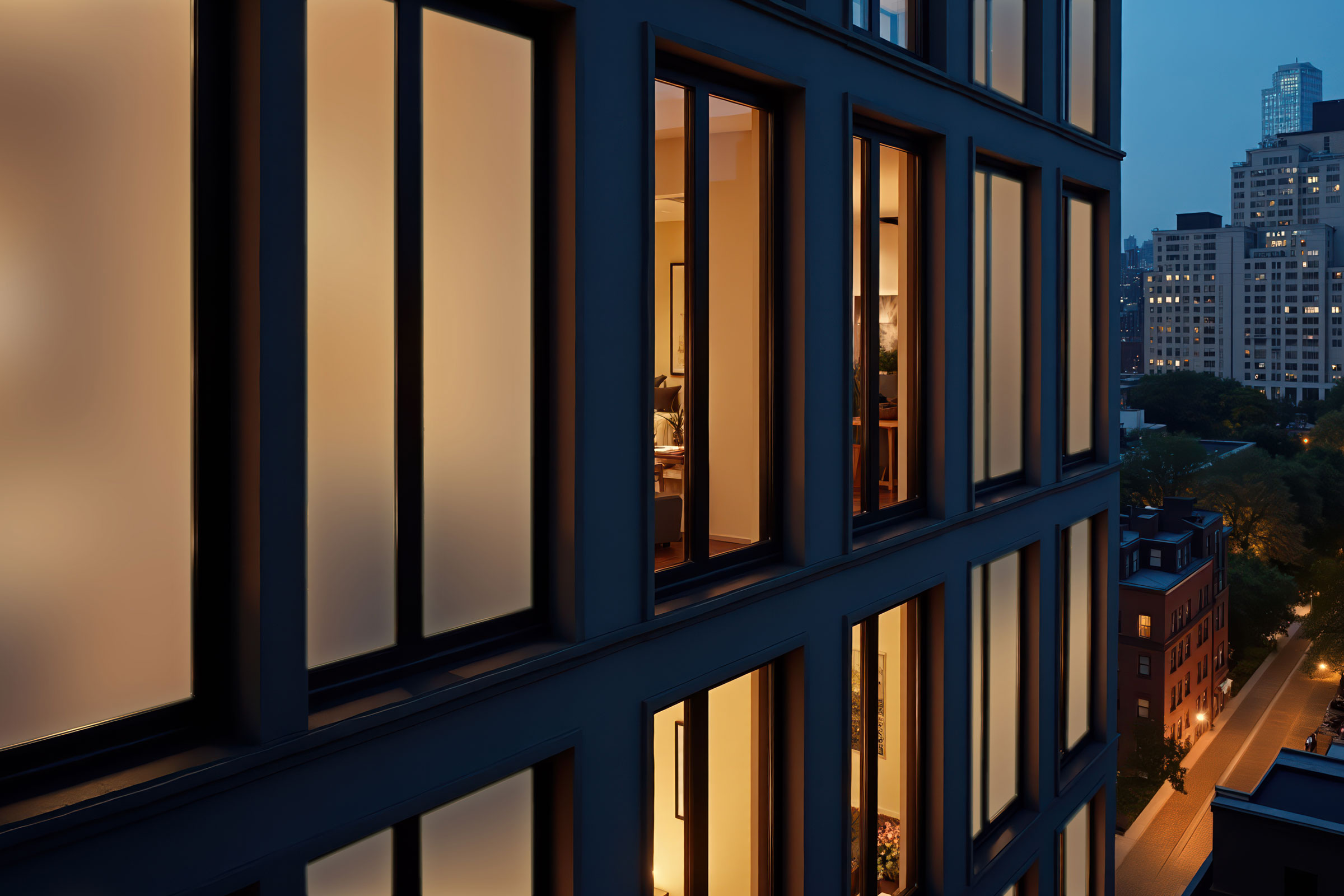
Residential privacy glass—like this smart glass from Cardinal Glass—comes in many forms, each of which have their own pros and cons. Photo courtesy of Cardinal Glass
In the AEC sector residential privacy glass refers to those glass and window solutions designed to provide residential projects with increased privacy compared to transparent windows.
The main benefit of residential privacy glass is, well, privacy. It helps occupants and homeowners shield themselves from prying eyes, providing a sense of security and safety. Many privacy glass solutions also help lower utility costs by reducing the amount of solar energy that enters a home.
This added privacy and energy efficiency, however, comes at an additional cost, with most types of residential privacy glass costing at least 20% more than comparable clear glass solutions.
Types of Residential Privacy Glass
Today’s market provides homeowners with a range of options to choose from when it comes to residential privacy glass, each of which comes with its own set of pros and cons.
Tinted
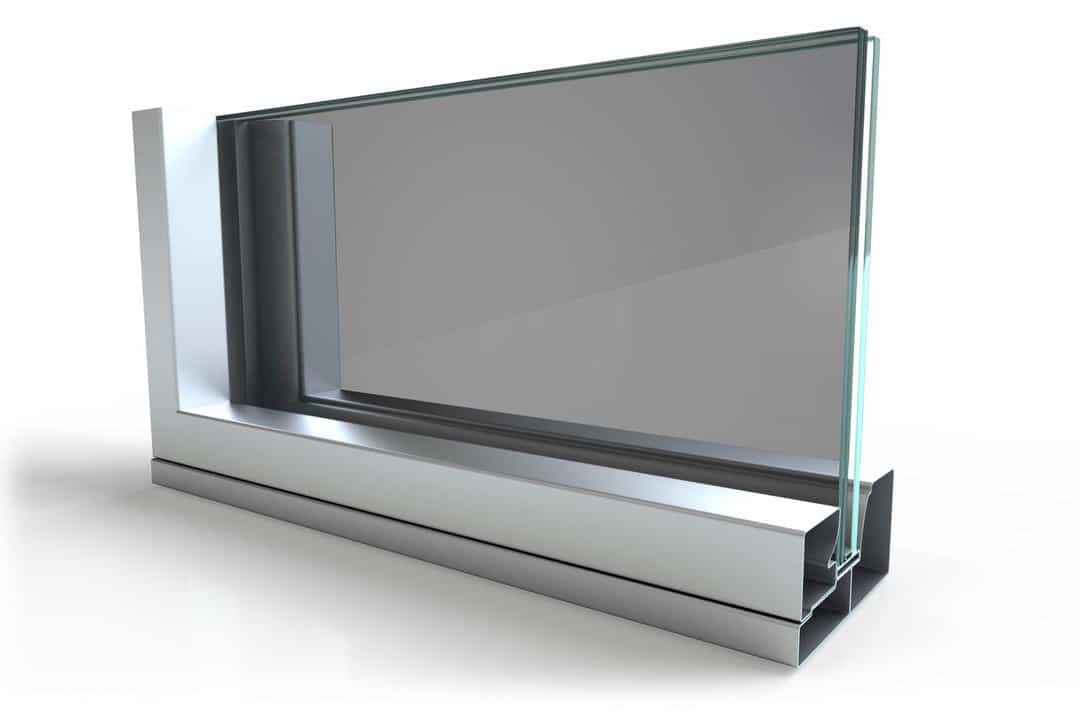
HALIO’s Smart-Tinting Glass is controlled through an app. Photo courtesy of HALIO
True tinted privacy glass is created through the addition of a small amount of metal oxides during manufacturing. These oxides color the glass gray, bronze, green, or blue, with gray being the most common for residential projects. Tint can also be applied after the fact by way of a thin film, of which is typically made from polyester and uses dyes and metal particles to achieve its darkened appearance.
It is these microscopic metal particles that allow tinted windows to reflect solar energy, which in turn helps create a mirror-like effect that makes it difficult to see inside during daytime hours. The level of privacy provided by tinted glass can be altered depending on the amount of tint added during the manufacturing process or depending on the shade of film applied.
In recent years companies like HALIO—formerly Kinestral Technologies—have taken tinting technology a step further, incorporating it into smart window systems that are capable of adjusting to different light levels automatically or manually via an app.
Pros of Tinted Glass:
- Energy-efficient. By reflecting, absorbing, and converting solar energy, tinted privacy glass helps reduce solar heat gain, improving energy efficiency and lowering utility expenses.
- Reduced glare. The unique properties of tinted glass also help to reduce glare inside the home.
- Blocks UV rays. Another major benefit of tinted privacy glass is its ability to block UV rays, a characteristic that helps protect skin health and prevent furniture from fading over time.
Cons of Tinted Glass:
- Loses effectiveness at night. Tinted windows do a good job of providing privacy during daytime hours, but lose some of their effectiveness at night when interior lights are on, making it easier for some outside to see in.
- Can be difficult to install. While true tinted windows are no more difficult to install than conventional clear windows, tinted films are often marketed as DIY-friendly; improper installation, however, can lead to peeling, bubbles, or a generally uneven appearance.
Frosted & Etched
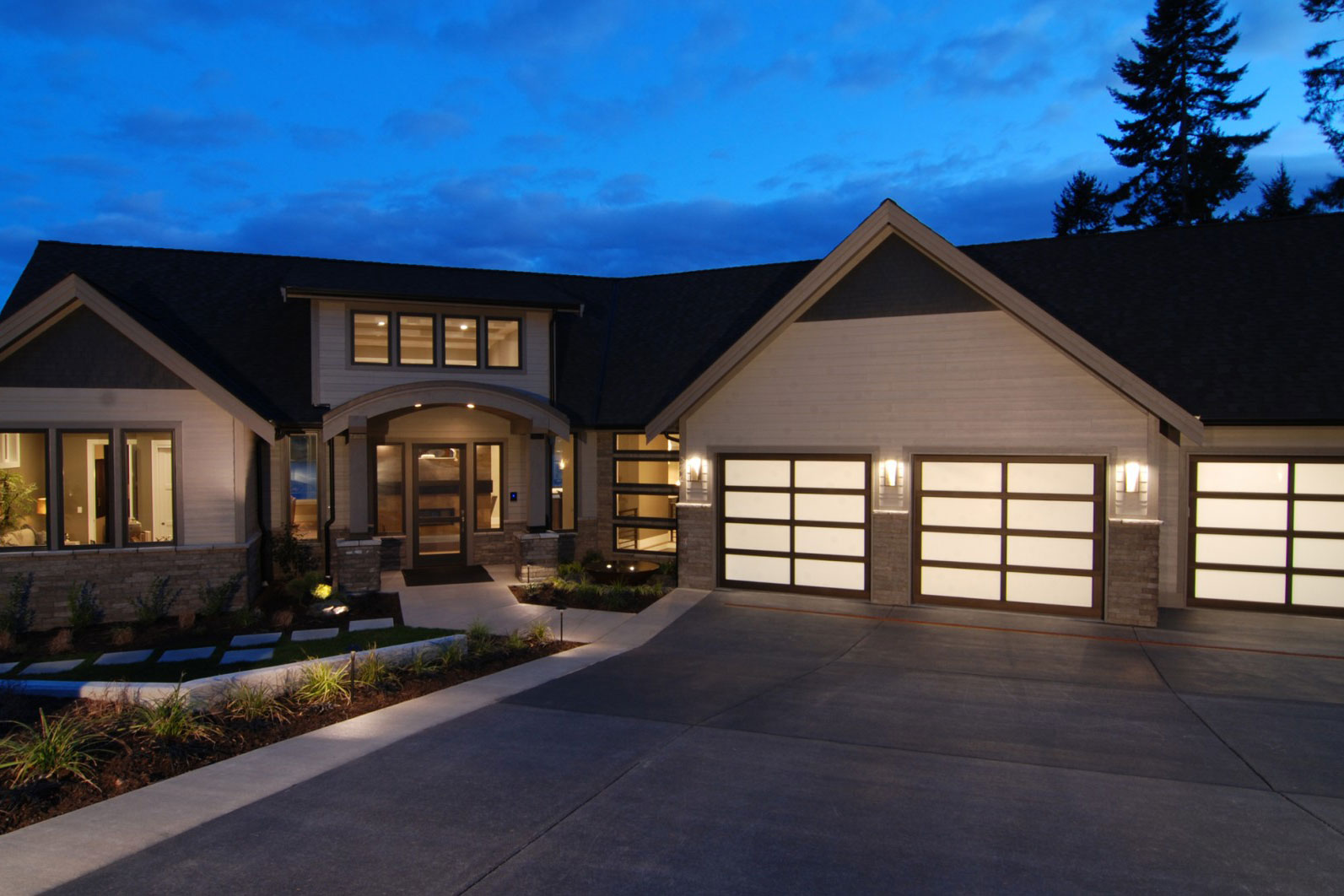
Photo courtesy of Hörmann Group North America
Frosted glass is a type of privacy glass whose distinct appearance is produced through acid etching or sandblasting, two methods that serve to create a pitted surface that scatters light and makes the glass translucent. Daylight is still able to enter through frosted glass windows, but the images on either side are made blurry and indistinct, providing a high degree of privacy.
Frosted privacy glass can also serve a decorative purpose, in which case it may be referred to as etched glass. Rather than sandblast or etch the entire sheet of glass, etched glass uses these methods to create a design covering a portion of the sheet, leaving certain areas clear and see-through. The degree of privacy offered by etched glass ultimately depends on the design.
Hörmann—a German manufacturer of doors, door frames, garages, and gates for both commercial and private real estate—offers a variety of frosted glass options in their garage door systems.
Pros of Frosted Glass:
- Total privacy. Frosted glass completely eliminates direct visibility wherever it is installed, making it extremely ideal in spaces that always require a high level of privacy.
- Aesthetic value. Frosted glass—and particularly etched glass—is stylish and visually appealing, meaning it can positively add to a home’s character and even resale value.
Cons of Frosted Glass:
- Reduced daylight admittance. Frosted glass lets in less light than conventional clear glass and some other privacy glass options, potentially making rooms feel darker or smaller if the window isn’t very large.
- Can be harder to clean. Because of its pitted and textured surface, things like fingerprints, dust, and smudges are often more noticeable on frosted glass; this texturing also makes frosted glass more difficult to clean than traditional glass.
Rolled
Like etched glass, rolled glass—also referred to as patterned, figured, or obscure glass—is intended to provide privacy while also functioning as a decorative element. Created by shaping molten glass between two metal surfaces, rolled glass is characterized as having a texture or pattern embossed on one or both sides.
These patterns serve to diffuse light and make the glass translucent to varying degrees. Rolled glass is available in a wide range of patterns and styles, with complex designs typically offering a higher degree of privacy.
Pros of Rolled Glass:
- Design flexibility. Patterned glass is available in a wide range of designs and textures, allowing for a high degree of customization.
- Aesthetic appeal. Rolled glass enhances a home’s visual appeal and functions as a decorative element as much as it does a privacy feature.
- Light diffusion. The textured surface of patterned glass helps to scatter and diffuse light as it passes through, creating a comfortable indoor environment and reducing glare.
Cons of Rolled Glass:
- High maintenance. Because of their textured surface, rolled glass windows are prone to collecting dirt and grime, necessitating more frequent cleaning than smooth privacy glass options.
- Expensive. The manufacturing of rolled glass requires specialized machinery and incorporates additional steps when compared to traditional glass, making this one of the more expensive privacy glass options; the level of patterning ultimately dictates the cost.
Mirrored
Mirrored privacy glass uses a reflective coating to achieve a one-way mirror effect that prevents one from looking in without barring one from looking out—a characteristic that makes it much more versatile than, say, frosted glass. True mirrored glass is created by coating or encasing the glass with an extremely thin layer of metal (typically aluminum), although like tinted glass, mirrored privacy glass is also available as film that can be installed on existing windows.
Once installed the metal in mirrored glass reflects some light while the rest is admitted. As a general rule, one-way windows do not allow viewers on the brightly-lit side to see through to the other side, whereas viewers on the darker side can. This means mirrored glass windows are capable of providing the highest level of privacy during daytime hours when bright sunlight reflects off of their exterior face.
Pros of Mirrored Glass:
- Energy-efficient. Because they reflect solar energy, mirrored glass windows help reduce solar heat gain and improve energy efficiency.
- Aesthetically pleasing. Mirrored glass windows create a sleek, modern appearance that is in line with contemporary architectural preferences.
- High degree of privacy. As long as they are properly installed, mirrored glass windows can make it impossible for anyone to see inside during daytime hours, making them one of the most effective privacy glass options.
Cons of Mirrored Glass:
- Confuses birds. Traditional windows are already sources of confusion for birds, but reflective glass windows can be even more confusing, leading to a higher rate of fatal collisions.
- Varied effectiveness. Similar to tinted glass, mirrored glass does a great job of ensuring privacy during the day by reflecting daylight, but loses effectiveness at night when interior lights are on, making it easier to see inside.
Smart Glass
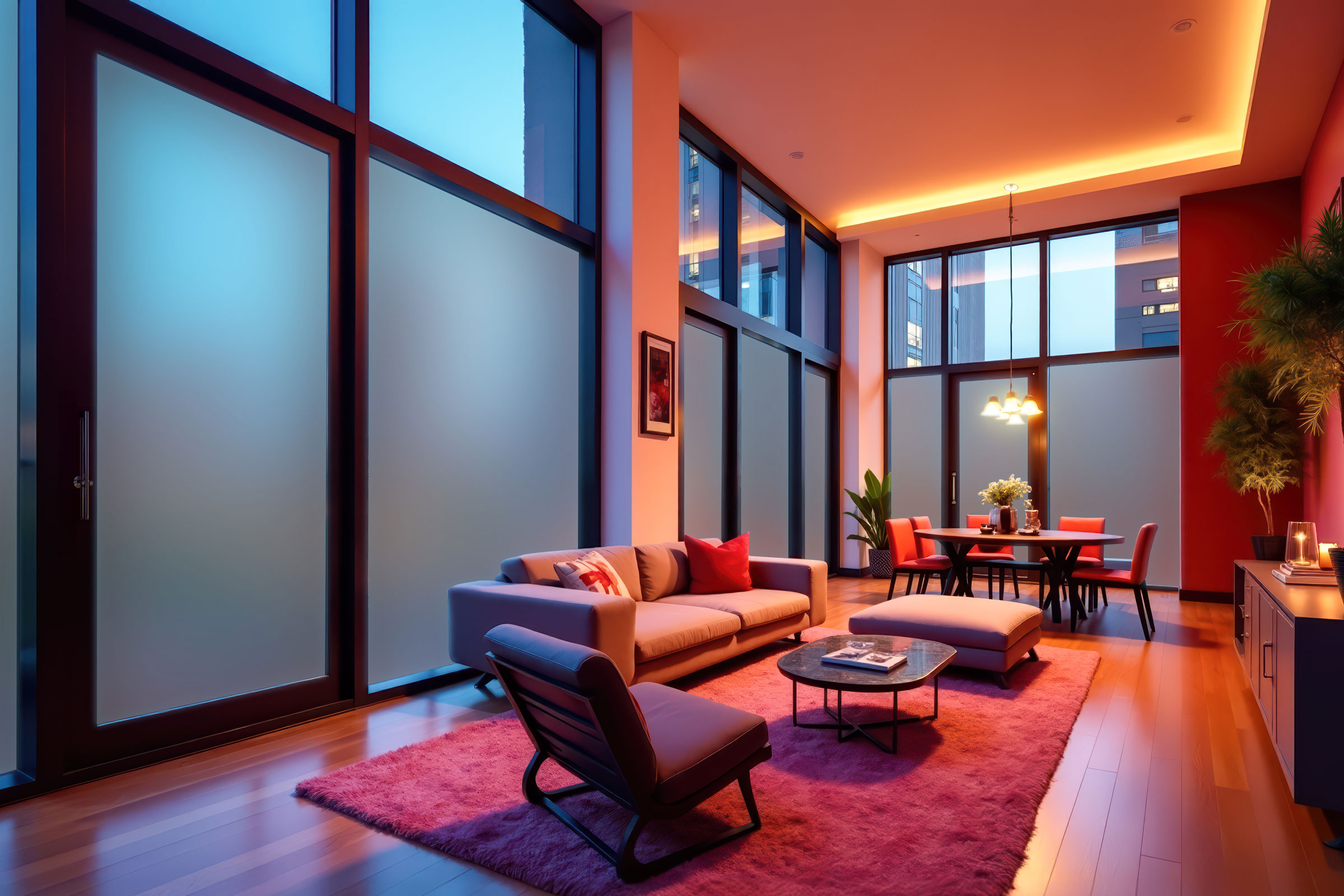
CLiC switchable privacy glass is among the latest in glass innovations. Photo courtesy of Cardinal Glass
While more common in commercial projects, smart glass—or glass that is capable of switching between transparent and translucent when an electric charge is applied—is becoming an increasingly viable means of ensuring privacy in residential projects.
There are four core subtypes of electronically-switchable smart glass: micro-blinds, polymer-dispersed liquid-crystal devices (PDLCs), suspended-particle devices (SPDs), and electrochromic devices.
- Micro-blinds. Feature microscopic rolls of thin metal blinds on glass; when no voltage is applied, the blinds are rolled and thus let light through; when a voltage is applied, the blinds unroll and prevent light from entering.
- PDLCs. Created by dissolving liquid crystals within a liquid polymer and letting the polymer cure into a solid, at which point the liquid crystals become incompatible with the polymer and form droplets; when no voltage is applied, the crystals are randomly arranged in the droplets and scatter light, creating an opaque surface; when voltage is applied, the crystals align and light is allowed to pass through the droplets undisturbed, resulting in a transparent sheet of glass.
- SPDs. Consist of a thin film laminate of rod-like nano-scale particles suspended in a liquid placed between two panes of glass; when no voltage is applied, the particles are randomly organized and thereby serve to block and absorb light; when a voltage is applied, the molecules then align and let light through.
- Electrochromic. Typically include several thin layers of a ceramic material that are then charged with a large number of lithium ions; when a voltage is applied, the lithium ions and electrons are transferred between layers, resulting in an instantaneous tinted effect; once voltage is shut off, the glass becomes clear again.
Cardinal Glass is a world-leading glass provider that offers comprehensive glass solutions for residential projects, including a line of electronically-switchable PDLC privacy glass called CLiC. Using a unique blend of polymer stabilized cholesteric texture liquid crystal technology, CLiC outperforms other types of smart privacy glass to deliver unparalleled clarity when switched off, eliminating the hazy murkiness that has historically plagued the technology.
“We developed our own formulation of a liquid crystal that gets applied directly to the glass with no film in between—just a piece of glass, the liquid crystal, and then another piece of glass,” Pete Whaley, project manager of product integration and stakeholder experience at Cardinal Glass, told gb&d in a previous article. “It’s much clearer than any other switchable glass on the market.”
Pros of Smart Glass:
- Switchable. Unlike the other options in this article, smart glass gives occupants the ability to instantly switch back and forth between clear and translucent.
- Energy-Efficient. When an electrical charge is applied, smart glass blocks solar heat gain and helps reduce overall energy use by 5 to 15% and peak summertime cooling loads by 25%.
- Low maintenance. Smart glass windows are just as easy to clean and maintain as traditional windows.
Cons of Smart Glass:
- Expensive. Out of all privacy glass solutions, smart glass is the most expensive, typically costing anywhere between $50 and $150 per square foot (compared to the $30 to $75 per square foot of traditional windows).
- Harder to source. There are comparatively few manufacturers and providers of electrically-switchable smart glass, which can make sourcing difficult.
- Specialized installation. Because they require an electrical charge, smart glass windows require specialized installation, further increasing their overall costs.
Applications for Residential Privacy Glass
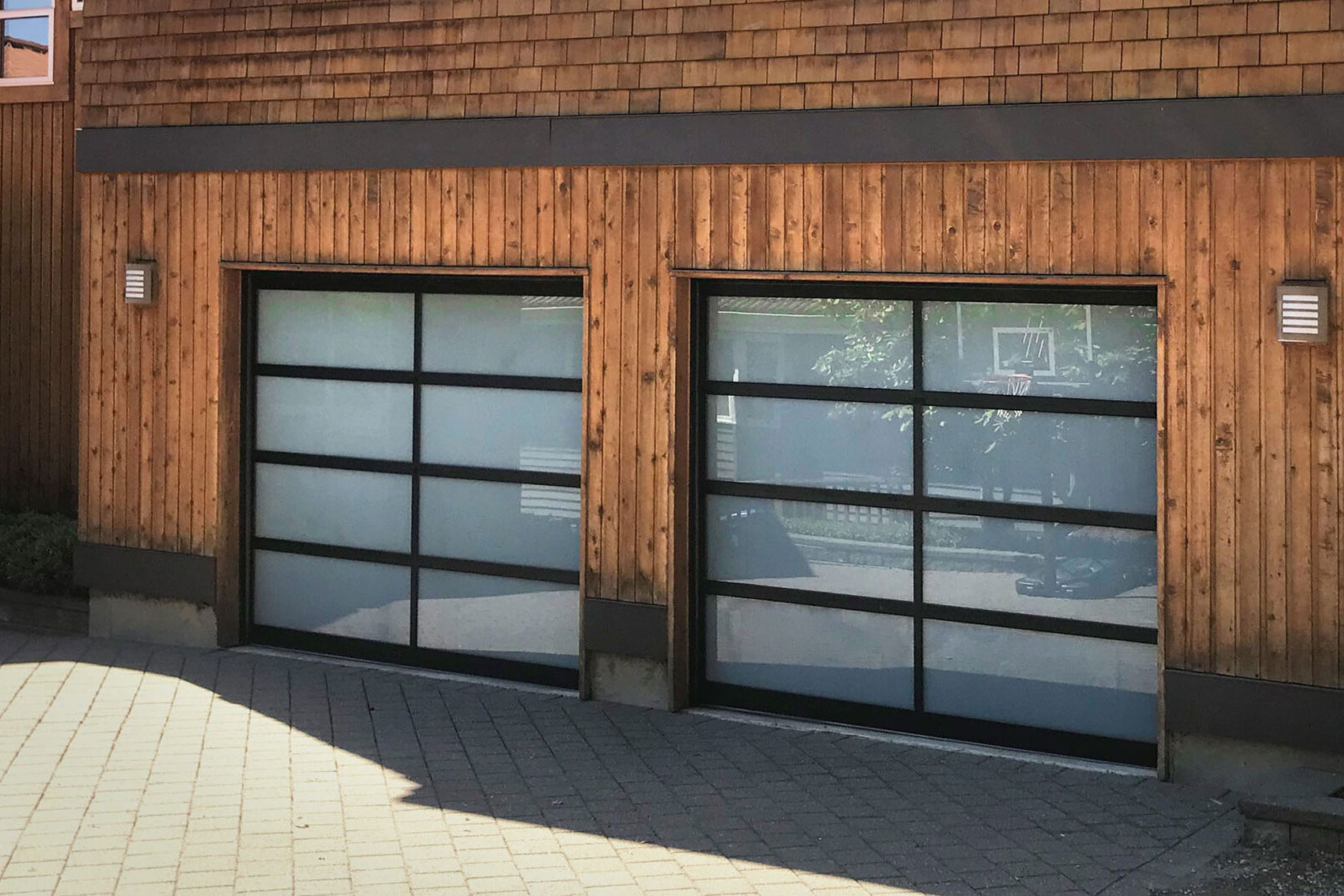
Residential privacy glass can be used in everything from windows and garage door systems to shower screens and sidelights. Photo courtesy of Hörmann Group North America
While all privacy glass solutions are capable of providing a sense of security, each type may not be appropriate for all residential applications. Because they typically block a larger percentage of sunlight than other privacy glass options, etched and frosted glass, for example, is commonly used in entry doors and garage doors rather than windows themselves, with the only real exception being bathroom windows. Frosted glass is also commonly used indoors for shower partitions.
Rolled glass, on the other hand, is best suited for front- or street-facing applications—like sidelights and transom windows—where its decorative features may be appreciated while still providing privacy. Like frosted glass, however, it is not uncommon to see patterned glass used for bathroom windows and shower screens.
Tinted and mirrored windows are more versatile, with many installing them throughout the home, although they are especially useful for rooms that receive a lot of direct sunlight throughout the day. When installed strategically, mirrored and tinted windows can improve both privacy and energy efficiency.
Thanks to their ability to switch back and forth between clear and translucent/opaque, smart glass can be installed almost anywhere in a home without issue. Like tinted and mirrored windows, however, smart glass is particularly useful in south- and west-facing rooms that receive direct sunlight, as their ability to switch between clear and opaque can help minimize unwanted solar heat gain as well as deliver privacy.

